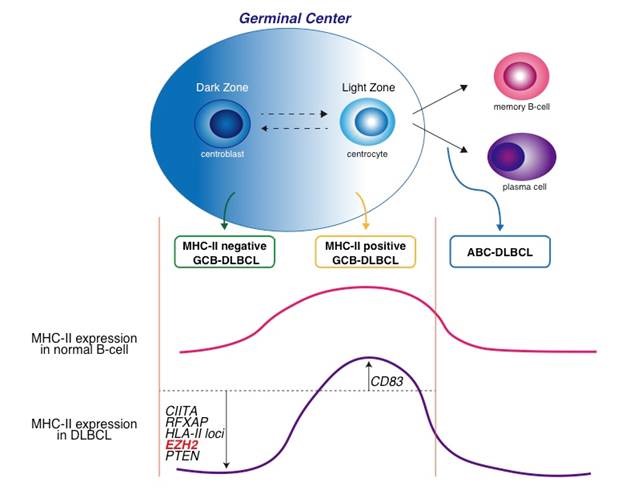A study by a group of BC-based scientists partly funded by the TFRI has discovered mutations responsible for changes in expression of major histocompatibility complex (MHC) in a subset of diffuse large B-cell lymphoma (DLCBL), revealing the genetic mechanisms used by tumors to escape immune attack.
The findings, which were published in Cancer Discovery (January 2019), demonstrated that a new therapy that combines EZH2 inhibitors with current immunotherapies could provide new hope for DLCBL patients with tumors lacking MHC expression.
“What we established for the first time in this study is a functional link between EZH2 mutations and reduced MHC expression,” explained Dr. Christian Steidl, director of the Centre for Lymphoid Cancer at BC Cancer and the paper’s senior author.
MHC is a set of molecules present on the cell surface whose main function are to present antigens on the surface of cancer cells in order to elicit an immune response. But when MHC is disrupted, the immune system is less responsive towards cancer cells, creating fertile ground for tumours to grow and making immunotherapies, which rely on the immune system to attack cancer, less effective.
The study showed that EZH2 inhibitors could be used to restore MHC expression in human EZH2-mutant DLCBL cells, opening the doors for the development of combination therapies that prevent immune escape, which is the process cancer cells use to avoid being detected and attacked by the immune system.
“The data generated from this study provides the rationale for developing combination therapies with epigenetic reprograming, like EZH2 inhibitors, and immunotherapies to restore MHC expression and improve clinical management of lymphoid cancer patients,” said Dr. Steidl.
To reach this conclusion, Dr. Steidl and his team performed integrative genomic studies of over 347 DLBCL patients.

Study
Molecular and Genetic Characterization of MHC Deficiency Identifies EZH2 as Therapeutic Target for Enhancing Immune Recognition
Authors
Daisuke Ennishi, Katsuyoshi Takata, Wendy Beguelin, Gerben Duns, Anja Mottok, PedroFarinha, Ali Bashashati, Saeed Saberi, Merrill Boyle, Barbara Meissner, Susana Ben-Neriah, Bruce W Woolcock, Adele Telenius, Daniel Lai, Matt Teater, Robert Kridel, Kerry J Savage, Laurie H. Sehn, Ryan D. Morin, Marco A. Marra, Sohrab P Shah, Joseph M Connors, Randy D. Gascoyne, David W. Scott, Ari M Melnick and Christian Steidl
Funding
This study was partly funded by the
Terry Fox New Frontiers Program Project Grant in Overcoming treatment failure in lymphoid cancers